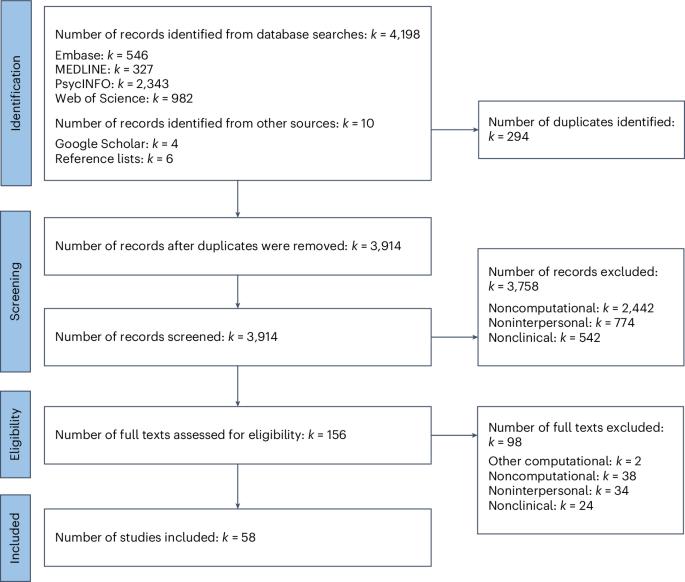A systematic review of computational modeling of interpersonal dynamics in psychopathology
IF 8.7
引用次数: 0
Abstract
Interpersonal dynamics have long been acknowledged as critical for the development and treatment of mental health problems. While recent computational approaches have been argued to be uniquely suited for investigating such dynamics, no systematic assessment has been made to scrutinize this claim. Here we conduct a systematic review to assess the utility of computational modeling in the field of interpersonal psychopathology. Candidate studies (k = 4,208), including preprints and conference manuscripts, were derived from five databases (MEDLINE, Embase, PsycINFO, Web of Science and Google Scholar) up to May 2025. A total of 58 studies met inclusion criteria and were assessed in terms of the validity, performance and transparency of their computational modeling. Bayesian modeling was the most common approach (k = 18), followed by machine learning (k = 17), dynamical systems modeling (k = 13) and reinforcement learning (k = 10). These approaches revealed several interpersonal disruptions across various mental health conditions, including rigid social learning in mood conditions, hypo- versus hyper-mentalizing in autism versus psychotic conditions and polarized relational dynamics in personality conditions. Despite these insights, critical challenges persist, with few studies reporting comprehensive performance metrics (16%) or adopting open science practices (20%). We discuss these challenges and conclude with more optimistic messages by suggesting that when rigorously and transparently conducted, computational approaches have the potential to advance our understanding of psychopathology by highlighting the social underpinnings of both mental health and disorder. This systematic review provides insights into interpersonal dynamics of psychopathology when using various computational approaches and highlights the key challenges in the field of social computational psychiatry, including the need to standardize computational tasks, apply diverse computational models to the same datasets, report more comprehensive performance metrics and adopt open science practices to enhance transparency.

精神病理学中人际动力学计算模型的系统综述
人际动力学长期以来一直被认为是心理健康问题发展和治疗的关键。虽然最近的计算方法被认为是唯一适合研究这种动态的方法,但没有系统的评估来仔细审查这一说法。在这里,我们进行了系统的回顾,以评估计算建模在人际精神病理学领域的效用。候选研究(k = 4,208),包括预印本和会议手稿,来源于截至2025年5月的五个数据库(MEDLINE, Embase, PsycINFO, Web of Science和谷歌Scholar)。共有58项研究符合纳入标准,并根据其计算模型的有效性、性能和透明度进行评估。贝叶斯建模是最常见的方法(k = 18),其次是机器学习(k = 17),动力系统建模(k = 13)和强化学习(k = 10)。这些方法揭示了不同心理健康状况下的几种人际关系中断,包括情绪条件下的刚性社会学习,自闭症与精神病条件下的低精神化与高精神化,以及人格条件下的极化关系动态。尽管有这些见解,关键的挑战仍然存在,很少有研究报告全面的性能指标(16%)或采用开放科学实践(20%)。我们讨论了这些挑战,并给出了更乐观的结论,即当严格和透明地进行时,计算方法有可能通过强调精神健康和精神障碍的社会基础来促进我们对精神病理学的理解。本系统综述提供了使用各种计算方法时对精神病理学人际动力学的见解,并强调了社会计算精神病学领域的关键挑战,包括标准化计算任务的需要,将不同的计算模型应用于相同的数据集,报告更全面的性能指标以及采用开放科学实践来提高透明度。
本文章由计算机程序翻译,如有差异,请以英文原文为准。
求助全文
约1分钟内获得全文
求助全文

 求助内容:
求助内容: 应助结果提醒方式:
应助结果提醒方式:


